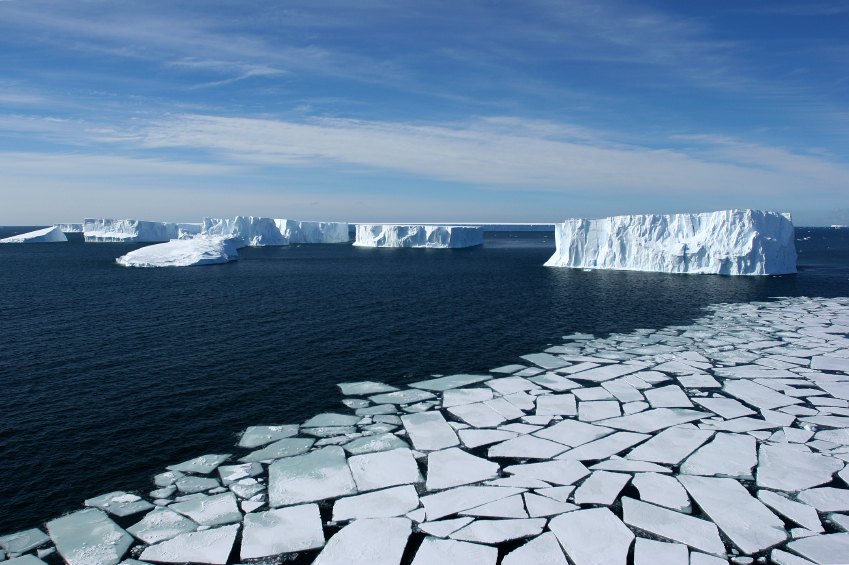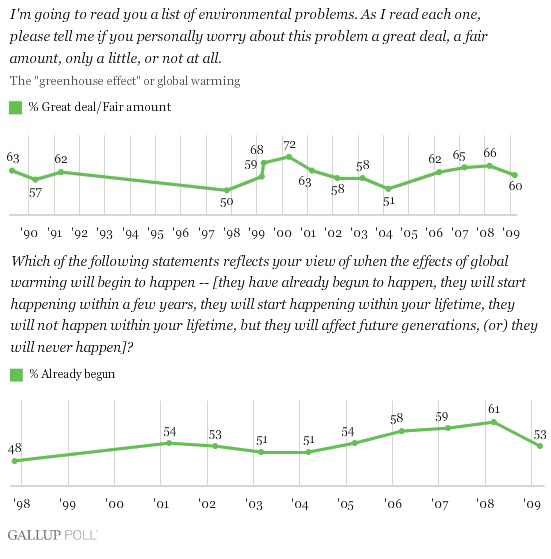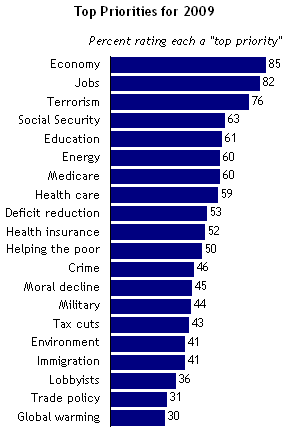Economic Crisis Sidelines Global Warming Concerns
Despite the administration’s focus on environmental issues, polls show that fewer Americans are worried about global warming than in recent years. Experts say the struggling economy is responsible.
Jul 31, 2020529 Shares529.4K Views
iStockphoto
As the Obama administration moves forward with its green agenda, climate change concerns have been elevated to a top priority. Yet in the midst of the deepening economic crisis, public opinion appears to be moving in the opposite direction.
Illustration by: Matt Mahurin
A Gallup pollreleased last Wednesday found a six percent drop from last year in the number of people who are worried a “great deal” or a “fair amount” about global warming, after that number had been increasing for the previous five years. It also showed that after a similar five-year climb, the percentage of respondents who believe that the effects of global warming have already begun had decreased by eight points over the past year. A record-high 16 percent of Americans now believe that global warming will never occur; in more than ten years of polling, no more than 11 percent of respondents had ever expressed this opinion.
The day after the poll was released, Sen. James Inhofe (R-Okla.), the ranking Republican on the Senate Environment and Public Works Committee and a leading climate change skeptic, took to the Senate floor and celebrated the resultsas a triumph of information. “You should never underestimate the intelligence of the American people,” he proclaimed. “Sadly, that is exactly what the promoters of man-made climate fears have been consistently doing, and the American people have consistently rejected climate alarm.”
Inhofe attributed the shift in public opinion to new studies from prominent scientists that he said contradicted the prevailing climate change arguments embraced by former Vice President Al Gore and the Intergovernmental Panel on Climate Change. “A steady stream of peer-reviewed studies, analyses, real world data and inconvenient developments have further refuted the claims of man-made global warming fear activists,” he said.
Gallup (click to enlarge)
On the other side of the climate debate, the Center for American Progress’ Joseph Romm, an acting assistant secretary of energy under Bill Clinton and an influential environmental activist, also chalked the changing attitudes up to a change in propaganda, albeit with a different slant.
“Objectively, in the last two years, the science makes painfully clear that climate risk has grown sharply,” he wrote on his blog, Climate Progress. “That means if the public has come to the reverse view, it must be due to the messaging and the media and the misinformers.” While “the vast majority of scientists are consistently bad at messaging,” he explained, global warming skeptics have “never stopped their single-minded disinformation campaign.”
Yet public opinion experts have a different explanation for the poll results.
Michael Dimock, associate director of the Pew Research Center, argues that the economic downturn has trumped all other concerns. “In a time of economic crisis, people are less willing to focus on an issue like global warming because they see other, more pressing issues,” he said.
A similar phenomenon took place after the Sept. 11 terrorist attacks, Dimock explained. “In January 2002, a few months after 9/11, the public’s sense of priority on a whole host of important issues just fell through the floor,” he said. “They expected the government, almost to the exclusion of other important things, to focus on this issue.”
Karlyn Bowman, who studies public opinion at the American Enterprise Institute, published a comprehensive reportin April 2008 that tracked polls on the environment and global warming over the past several decades. Her data showed that in the three years following the 9/11 attacks, fewer people said they were worried about global warming than in any other year in the past decade.
Similarly, she argues, the economic crisis has now pushed environmental considerations aside.
According to Paul Mohai, a professor of environmental policy and public opinion at the University of Michigan, this trend fits into historical patterns. “It’s not unusual at all that when there are economic problems in the country, concerns about the environment drop off,” he said.
Pew Research Center (click to enlarge)
The current economic crisis, of course, is the most severe in decades, and the Gallup poll is not the first to show its effects on public attitudes toward climate change. Every January, Pew conducts a poll to assess people’s “top priorities” for the government to address. This year, global warming came out on the very bottom of the list.
“
While the economy is likely the leading cause of reduced concern about global warming, these experts also posit a number of other possible explanations. Bowman and Mohai argue that Americans tend to feel less worried about a problem when they believe that the government is addressing it.
Bowman’s 2008 study backs up this claim. In every poll she recorded since 1971, people have had greater confidence in the Democratic Party to protect the environment. In the latest poll included in her study, a February 2008 Pew poll, 65 percent of respondents expressed greater confidence in Democrats on this issue, compared to just 21 percent for Republicans.
Dimock, on the other hand, points to Al Gore’s Oscar-winning 2006 documentary “An Inconvenient Truth” as a possible complement to the economic causes of the change in public opinion. He hypothesizes that as a highly polarizing figure, Gore may have solidified Democratic support for his environmental agenda while turning off some Republicans and independents.
Nonetheless, Dimock believes that the struggling economy is far and away the primary cause of the shift in public opinion.
Inhofe’s claim that the change stems from the propagation of new scientific studies that cast doubt on man-made global warming theories garnered little support from these experts. “If that is indeed happening, I haven’t seen it on the news, and I follow it pretty closely,” said Mohai.
So what might cause Americans to renew their global warming concerns? In the lingo of Bill Clinton’s 1992 campaign, it’s the economy, stupid.
Just as President Obama has tied his economic agenda to an environmental one, it appears that Americans’ global warming concerns will rise and fall with their 401(k)s.

Hajra Shannon
Reviewer
Latest Articles
Popular Articles



